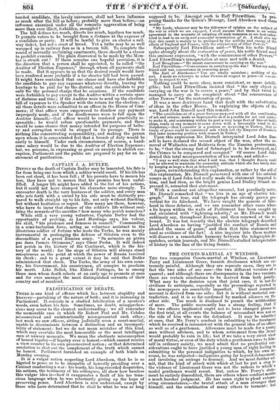FALSIFICATION OF DEBATE.
THERE is one kind of offence which lies between stupidity and knavery—partaking of the nature of both; and it is increasing in Parliament. It consists in a studied falsification of a speaker's words, even before his face. Sometimes, no doubt, misapprehen- sions may occur to the clearest understanding : we all remember the memorable case in which Sir Robert Peel and Mr. Cobden misconceived and unintentionally misrepresented each other ; last week we saw officers, sitting judicially upon a court-martial, unable to discriminate between a distinction and an incompati- bility of statement: but we do not mean mistakes of this kind, which may overtake the most honourable or the most intelligent men at unwary moments. We mean the obstinate misconception of honest bigotry—if bigotry ever is honest—which cannot receive a view counter to its own preconceived notion; or that determined resolution to shut out the complement of the truth which cannot be honest. Parliament furnished an example of both kinds on Monday evening. • It is a vulgar notion respecting Lord Aberdeen, that he is so bigoted to peace as to be incapable of honestly presiding over a Cabinet conducting a war: his words, his long-recorded despatches, his actions, the testimony of his colleagues, all show how baseless this vulgar idea is—how it exaggerates a fault of his too tena- cious language when he was reluctantly giving up the hope of preserving peace. Lord Aberdeen is now understood, except by those who have determined that he shall be what he was so long supposed to be. Amongst such is Earl FitzWilliate. In peo,. posing thanks for the Queen's Message, Lord Aberdeen used these
' words-
!"My Lords, whatever may be the'difference of opinion on the subject of the war in which we are engaged, I shall assume that there is an entire agreement in the necessity of adopting all such measures as are best Wee- , hated to lead to an early and successful termination of rt. shall also Rev that this result is mainly to be. produced by the activity and energy of the efforts of England and France, with the concurrence of other Powers."
Subsequently Earl Fitzwilliam said—"When his noble friend spoke strongly about the restoration of peace, his noble friend used this ominous expression, ' with the concurrence of other Powers." Lord Fitzwilliam's interpretation at once met with a denial.
Lord Brougham—"He meant concurrence in carrying on the war." Earl Fitzwilliam-4'ConcuiTence in carrying on the war! What my noble The Earl concurrence in Peti.loicuarri:g peace." I mistaken ; nothing of the
friend s id
sort. I made no reference to other Powers in respect to peace—it was en- tirely in respect to war."
Nothing could be more clear, more consistent, or more intelli- gible; but Lord Fitzwilliam insisted that " the only object in carrying on the war is to secure a peace," and by that twist he managed to carry on the complaint about "the concurrence of other Powers" for the restoration of peace.
It was a more dexterous hand that dealt with the substitution of ideas in the other House. In explaining the objects of the war, Lord John Russell used this remark— "The establishment of a great fortress prepared with all the combination of art and science, made as impregnable as it is possible for art and science to make it and containing within its port a very large fleet of line-of-battle ships,, ready at any moment to come down with a favourable wind to at, Bosphorus,—that I consider so menacing to Turkey, that no
position
treaty of peace could be conii_ci.d which left the Emperor of Russia in that same menacing position with respect to Turkey." Upon this expression Mr. Disraeli interpreted Lord John Rus- sell to have declared the second object of the war, after the re- moval of Wallachia and-Moldavia from the Russian protectorate, to be, " that the strong fort of Sebastopol is to be destroyed, and the Crimea to be conquered and occupied." Of course Lord John denied this total misrepresentation of his words, and added— "I may as well state that what I said was, that I thought Russia could
not be allowed to maintain the menacing
by keeping so large a fleet at Sebastopol.", attitude which she bus lately done
Again, notwithstanding this explanation, or rather by the aid of this explanation, Mr. Disraeli persevered with one of his satirical essays as if Lord John had really made the statement imputed to him, and had then, as the bright genius Lord Dudley Stuart ex- pressed it, retracted that statement.
With a candour not altogether unusual, but peculiarly naïve, Mr. Disraeli remarked that "we live in an age of electric tele- graph." Most true, and the telegraph has already grown pro- verbial for its falsehood. 'N'fc,have caught the genesis of false- hood in these debates, and tie can remember other eases where a lie begun within the walls of Parliament has been caught up and circulated with "lightning celerity," as Mr. Disraeli -would sublimely say, throughout Europe, and then renewed at the re- bound. It was but recently that the electric telegraph described Lord Aberdeen as having "justified the conduct of Russia and pleaded the cause of peace," and then that false statement was used as evidence of the fact! A. nice inqUirer into these matters will discover a remarkable harmony between the telegraphic de- spatches, certain journals, and Mr. Disraeli's studied interpretation of history in the face of the living Senate.


































 Previous page
Previous page